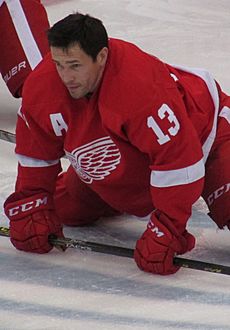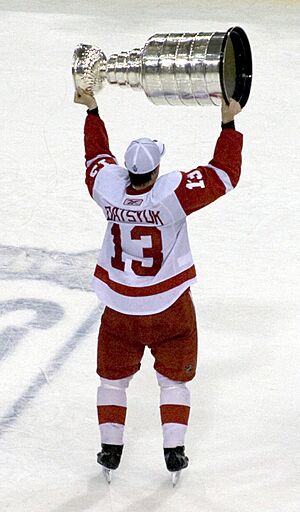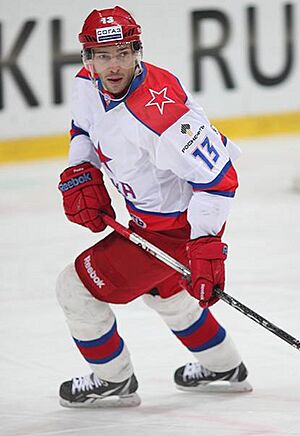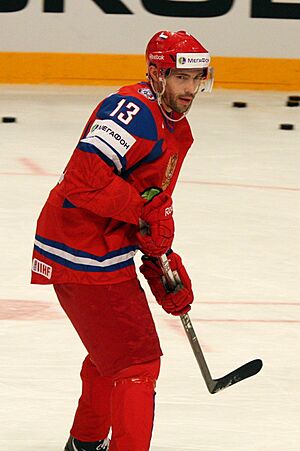Pavel Datsyuk facts for kids
Quick facts for kids Pavel Datsyuk |
|||
|---|---|---|---|
| Hockey Hall of Fame, 2024 | |||

Datsyuk with the Detroit Red Wings in March 2015
|
|||
| Born | 20 July 1978 Sverdlovsk, Russian SFSR, Soviet Union |
||
| Height | 5 ft 11 in (180 cm) | ||
| Weight | 198 lb (90 kg; 14 st 2 lb) | ||
| Position | Centre | ||
| Shot | Left | ||
| Played for | Spartak Yekaterinburg Ak Bars Kazan Detroit Red Wings Dynamo Moscow CSKA Moscow SKA Saint Petersburg Avtomobilist Yekaterinburg |
||
| National team | |||
| NHL Draft | 171st overall, 1998 Detroit Red Wings |
||
| Playing career | 1996–2021 | ||
Pavel Valeryevich Datsyuk (Russian: Па́вел Вале́рьевич Дацю́к, IPA: [ˈpavʲɪl dɐˈtsuk]; born 20 July 1978) is a Russian former professional ice hockey player. He played for the Detroit Red Wings in the National Hockey League (NHL) from 2001 to 2016. People often called him the "Magic Man" because of his incredible skills.
Datsyuk is known as one of the "100 Greatest NHL Players" in history. He won the Stanley Cup twice with the Red Wings, in 2002 and 2008. He also won the Gagarin Cup in 2017 with SKA Saint Petersburg in Russia. Pavel played for the Russia men's national ice hockey team in many Olympic Games. He was the team captain in 2014 and 2018. After winning a gold medal at the 2018 Olympics, Datsyuk joined the exclusive Triple Gold Club.
He won the Frank J. Selke Trophy three times as the NHL's best defensive forward. He also won the Lady Byng Memorial Trophy four times in a row for his great performance and sportsmanship. Datsyuk was inducted into the Hockey Hall of Fame in 2024.
Contents
Early Life and Hockey Start
Pavel Datsyuk was born in Sverdlovsk, which was part of the Soviet Union at the time. His family called him "Pasha." He faced some tough times growing up, especially when his mother passed away when he was 15.
Even though Datsyuk had good hockey skills, scouts sometimes overlooked him. This was because he was smaller than many other players. He started playing for a team called Dynamo Yekaterinburg in the mid-1990s. His career really took off when a famous coach, Vladimir Krikunov, started coaching his team. Krikunov noticed Pavel's talent, even seeing how good he was at soccer. Under Krikunov's coaching, Datsyuk became a very effective player who was good at both offense and defense.
Playing Career Highlights
Starting in Russia
A scout for the Detroit Red Wings, Håkan Andersson, first saw Datsyuk play in 1997. Andersson was actually there to watch another player, but Datsyuk caught his eye. Andersson was the only NHL scout to see Datsyuk play before the 1998 NHL Entry Draft. The Red Wings then picked him 171st overall in that draft.
Even after being drafted, Datsyuk continued to play in Russia. He played for Dynamo Yekaterinburg until 2000. Then, he played for AK Bars Kazan during the 2000-01 season.
Detroit Red Wings: A Long Career (2001–2016)
First Stanley Cup Win
When Datsyuk joined the Red Wings in 2001, older Russian stars like Igor Larionov and Sergei Fedorov helped him learn the ropes. He played well in his first year. The Red Wings won the Presidents' Trophy as the best team in the regular season. Datsyuk helped them win the Stanley Cup that year, scoring three goals and three assists.
In his second season, Henrik Zetterberg joined Datsyuk's line. They became known as the "Two Kids and an Old Goat Line" with Brett Hull. Datsyuk had 51 points that season, even though he missed some games due to a knee injury.
After Sergei Fedorov left in 2003, Datsyuk became an even more important player for the Red Wings. His amazing playmaking skills earned him a spot in the 2004 NHL All-Star Game. He finished the 2003–04 season with 68 points.
During the 2004–05 NHL lockout, Datsyuk played for Dynamo Moscow in Russia. He later signed a new contract with the Red Wings in 2005. In the 2005–06 season, Datsyuk played at a very high level and showed great sportsmanship. He only had 22 penalty minutes all season. This earned him the Lady Byng Trophy, which he would win four times in a row. He also played for the Russian national team in the 2006 Winter Olympics.
Becoming a Star and Second Stanley Cup
In the 2006–07 season, Datsyuk continued to shine, matching his previous season's total of 87 points. Before the 2007 playoffs, he signed a long contract extension with the Red Wings. He helped Detroit reach the Western Conference Finals, contributing 16 points in 18 games.
In 2007–08, fans voted Datsyuk to start in the 2008 All-Star Game. He had his best year yet, scoring 97 points (31 goals, 66 assists) in all 82 games. He also led all Red Wings forwards in blocked shots. The Red Wings won the Presidents' Trophy again. In the 2008 playoffs, Datsyuk scored his first NHL hat-trick on May 12. The Red Wings went on to win their 11th Stanley Cup title, beating the Pittsburgh Penguins. This was Datsyuk's second Stanley Cup.
Datsyuk was awarded the Frank J. Selke Trophy as the league's best defensive forward. He also won the Lady Byng Trophy again for his sportsmanship. He was the first player in over 70 years to win the Lady Byng three times in a row.
Datsyuk was chosen for his third NHL All-Star Game in 2009. However, he could not play due to a hip injury. He finished the 2008–09 season with 97 points again. He won the Frank J. Selke Trophy and the Lady Byng for the fourth year in a row. In the 2009 playoffs, Datsyuk got injured and missed some games. The Red Wings still made it to the Stanley Cup Finals again, but they lost to the Pittsburgh Penguins in seven games.
In the 2009–10 season, Datsyuk scored 70 points and won his third straight Selke Trophy. The Red Wings had a strong finish to the season, moving up to fifth place in their conference. They won their first-round series against the Phoenix Coyotes.
Datsyuk had a "Gordie Howe hat trick" on the first night of the 2010–11 season. This means he scored a goal, had an assist, and got into a fight in one game. He broke his wrist in December, missing 19 games. Despite the injury, he was a finalist for the Selke Trophy again. In the 2011 playoffs, Datsyuk led his team with 15 points. He helped the Red Wings almost come back from a 3-0 deficit in their second-round series.
For the 2011–12 season, Datsyuk wore jersey number 24 in pre-season to honor his former teammate Ruslan Salei, who passed away in a plane crash. He later switched back to his usual number 13. Datsyuk was a candidate for the League MVP award until he had knee surgery in February 2012. He finished the season with 67 points and was named to the 2012 NHL All-Star Game. He was also a finalist for the Selke Trophy for the fifth year in a row.
During the 2012–13 NHL lockout, Datsyuk played for CSKA Moscow in the Kontinental Hockey League (KHL). When the NHL season started again in January 2013, Datsyuk returned to the Red Wings. He scored 49 points in 47 games. He was a finalist for the Selke Trophy for the sixth straight year. The Red Wings made it to the second round of the 2013 playoffs, but they lost to the Chicago Blackhawks in seven games.
Final Years in Detroit
Datsyuk signed a three-year contract extension with Detroit in June 2013. He missed some games in the 2013–14 season due to a concussion and a knee injury. He finished that season with 37 points. The Red Wings lost in the first round of the 2014 playoffs.
He missed the first five games of the 2014–15 season because of a shoulder injury. He ended the season with 65 points. He was also a finalist for the Lady Byng Memorial Trophy for the sixth time.
Datsyuk missed the first 15 games of the 2015–16 season recovering from ankle surgery. On February 14, 2016, Datsyuk reached his 900th point in a game against the Boston Bruins. He became the sixth Red Wing player and fifth Russian player in league history to reach this milestone. He finished his last season with the Red Wings with 49 points. The Red Wings lost in the first round of the 2016 playoffs.
On June 18, 2016, Datsyuk announced he was leaving Detroit to play in Russia. He ended his 14-year career with the Red Wings. He had won two Stanley Cups and four Lady Byng trophies with the team. He was the last player remaining from the Red Wings' 2002 Stanley Cup Championship team.
Return to Russia (2016–2021)
SKA Saint Petersburg
On July 8, 2016, Datsyuk signed a two-year contract with SKA Saint Petersburg in the KHL. In his first season back in the KHL, he helped SKA Saint Petersburg win the Gagarin Cup. He played for SKA Saint Petersburg until 2019.
Avtomobilist Yekaterinburg
In June 2019, Datsyuk decided to continue playing in the KHL. He returned to his hometown team, Avtomobilist Yekaterinburg, on a one-year contract. He played for Avtomobilist for two seasons and retired from hockey in 2021.
Pavel's Playing Style
Throughout his career, Datsyuk was known as a top "two-way forward." This means he was excellent at both offense (scoring and setting up goals) and defense (stopping the other team). He won the Frank J. Selke Trophy three times as the league's best defensive forward.
Datsyuk was also famous for his amazing stickhandling and ability to trick opposing players. One of his moves was even called "The Datsyukian." Because of his incredible skills, he earned the nickname "The Magic Man."
"I'd call Datsyuk a master chess player. As a goalie, your nightmare is when the puck carrier has multiple options. Datsyuk has a knack for seeing the entire ice and holding onto the puck until space opens up and he has a couple different plays he can make. He kind of stretches you and forces you to get caught in the middle of taking away the shot or taking away the pass. You have to commit to one or you're toast. It's a 50-50 gamble sometimes with him."
Personal Life
Pavel Datsyuk met his first wife, Svetlana, when he was 18. They married three years later and had a daughter named Elizabeth in 2004. They later divorced in 2010. Datsyuk married his second wife, Maria, in 2012. They have a daughter named Vasilisa, born in 2014, and a son named Pavel Jr., born in 2017.
Pavel Datsyuk is a Russian Orthodox Christian.
Career Achievements and Awards
International Awards
|
Datsyuk warming up during a 2012 World Championship game |
||
| Medal record | ||
|---|---|---|
| Men's ice hockey | ||
| Representing |
||
| Olympic Games | ||
| Gold | 2018 Pyeongchang | |
| Representing |
||
| Olympic Games | ||
| Bronze | 2002 Salt Lake City | |
| World Championships | ||
| Gold | 2012 Finland/Sweden | |
| Silver | 2010 Germany | |
| Bronze | 2005 Austria | |
| Bronze | 2016 Russia | |
- World Championship best forward – 2010
- World Championship All-Star team – 2010
- Olympic All-Star team – 2018
NHL Awards
- 2-time Stanley Cup champion – 2002, 2008
- NHL Second All-Star team – 2009
- Selected to the NHL All-Star Game – 2004, 2008, 2009*, 2012
- Played in the NHL YoungStars Game – 2002
- Lady Byng Memorial Trophy – 2006, 2007, 2008, 2009
- Frank J. Selke Trophy – 2008, 2009, 2010
- NHL Plus-Minus Award – 2008
- Selected as one of the 100 Greatest NHL Players (2017)
- Elected to Hockey Hall of Fame - 2024
* did not attend
KHL Awards
- Gagarin Cup champion – 2017
- 2-time KHL All-Star – 2013, 2017
- Sergey Gimayev Prize (top veteran player) – 2021
Career Statistics
Regular Season and Playoffs
| Regular season | Playoffs | |||||||||||||
|---|---|---|---|---|---|---|---|---|---|---|---|---|---|---|
| Season | Team | League | GP | G | A | Pts | PIM | GP | G | A | Pts | PIM | ||
| 1994–95 | SKA Avtomobilist–2 Yekaterinburg | RUS.2 | 8 | 0 | 1 | 1 | 4 | — | — | — | — | — | ||
| 1995–96 | SKA Avtomobilist–2 Yekaterinburg | RUS.2 | 44 | 8 | 9 | 17 | 8 | — | — | — | — | — | ||
| 1996–97 | Spartak Yekaterinburg | RSL | 18 | 2 | 2 | 4 | 4 | — | — | — | — | — | ||
| 1996–97 | SKA Yekaterinburg | RUS.3 | 7 | 3 | 3 | 6 | 2 | — | — | — | — | — | ||
| 1997–98 | Dinamo–Energija Yekaterinburg | RSL | 24 | 3 | 4 | 7 | 4 | — | — | — | — | — | ||
| 1998–99 | Dinamo–Energija Yekaterinburg | RUS.2 | 13 | 9 | 8 | 17 | 2 | — | — | — | — | — | ||
| 1998–99 | Dinamo–Energija–2 Yekaterinburg | RUS.3 | 10 | 14 | 14 | 28 | 4 | — | — | — | — | — | ||
| 1999–2000 | Dinamo–Energija Yekaterinburg | RSL | 15 | 1 | 3 | 4 | 4 | — | — | — | — | — | ||
| 2000–01 | Ak Bars Kazan | RSL | 42 | 9 | 19 | 28 | 12 | 4 | 0 | 1 | 1 | 2 | ||
| 2001–02 | Detroit Red Wings | NHL | 70 | 11 | 24 | 35 | 4 | 21 | 3 | 3 | 6 | 2 | ||
| 2002–03 | Detroit Red Wings | NHL | 64 | 12 | 39 | 51 | 16 | 4 | 0 | 0 | 0 | 0 | ||
| 2003–04 | Detroit Red Wings | NHL | 75 | 30 | 38 | 68 | 35 | 12 | 0 | 6 | 6 | 2 | ||
| 2004–05 | Dynamo Moscow | RSL | 47 | 15 | 17 | 32 | 16 | 10 | 6 | 3 | 9 | 4 | ||
| 2005–06 | Detroit Red Wings | NHL | 75 | 28 | 59 | 87 | 22 | 5 | 0 | 3 | 3 | 0 | ||
| 2006–07 | Detroit Red Wings | NHL | 79 | 27 | 60 | 87 | 20 | 18 | 8 | 8 | 16 | 8 | ||
| 2007–08 | Detroit Red Wings | NHL | 82 | 31 | 66 | 97 | 20 | 22 | 10 | 13 | 23 | 6 | ||
| 2008–09 | Detroit Red Wings | NHL | 81 | 32 | 65 | 97 | 22 | 16 | 1 | 8 | 9 | 5 | ||
| 2009–10 | Detroit Red Wings | NHL | 80 | 27 | 43 | 70 | 18 | 12 | 6 | 7 | 13 | 8 | ||
| 2010–11 | Detroit Red Wings | NHL | 56 | 23 | 36 | 59 | 15 | 11 | 4 | 11 | 15 | 8 | ||
| 2011–12 | Detroit Red Wings | NHL | 70 | 19 | 48 | 67 | 14 | 5 | 1 | 2 | 3 | 2 | ||
| 2012–13 | CSKA Moscow | KHL | 31 | 11 | 25 | 36 | 4 | — | — | — | — | — | ||
| 2012–13 | Detroit Red Wings | NHL | 47 | 15 | 34 | 49 | 14 | 14 | 3 | 6 | 9 | 4 | ||
| 2013–14 | Detroit Red Wings | NHL | 45 | 17 | 20 | 37 | 6 | 5 | 3 | 2 | 5 | 0 | ||
| 2014–15 | Detroit Red Wings | NHL | 63 | 26 | 39 | 65 | 8 | 7 | 3 | 2 | 5 | 2 | ||
| 2015–16 | Detroit Red Wings | NHL | 66 | 16 | 33 | 49 | 14 | 5 | 0 | 0 | 0 | 4 | ||
| 2016–17 | SKA Saint Petersburg | KHL | 44 | 12 | 22 | 34 | 14 | 7 | 3 | 5 | 8 | 27 | ||
| 2017–18 | SKA Saint Petersburg | KHL | 37 | 8 | 27 | 35 | 8 | 15 | 4 | 3 | 7 | 0 | ||
| 2018–19 | SKA Saint Petersburg | KHL | 54 | 12 | 30 | 42 | 6 | 12 | 1 | 6 | 7 | 4 | ||
| 2019–20 | Avtomobilist Yekaterinburg | KHL | 43 | 5 | 17 | 22 | 10 | 4 | 2 | 2 | 4 | 2 | ||
| 2020–21 | Avtomobilist Yekaterinburg | KHL | 51 | 12 | 23 | 35 | 10 | 5 | 1 | 2 | 3 | 0 | ||
| RSL totals | 146 | 30 | 45 | 75 | 40 | 14 | 6 | 4 | 10 | 6 | ||||
| NHL totals | 953 | 314 | 604 | 918 | 228 | 157 | 42 | 71 | 113 | 55 | ||||
| KHL totals | 260 | 60 | 144 | 204 | 52 | 43 | 11 | 18 | 29 | 33 | ||||
International Play
| Year | Team | Event | Result | GP | G | A | Pts | PIM | |
|---|---|---|---|---|---|---|---|---|---|
| 2001 | Russia | WC | 6th | 7 | 0 | 4 | 4 | 0 | |
| 2002 | Russia | OG | 6 | 1 | 2 | 3 | 0 | ||
| 2003 | Russia | WC | 7th | 7 | 1 | 4 | 5 | 0 | |
| 2004 | Russia | WCH | 5th | 4 | 1 | 0 | 1 | 0 | |
| 2005 | Russia | WC | 9 | 3 | 4 | 7 | 0 | ||
| 2006 | Russia | OG | 4th | 8 | 1 | 7 | 8 | 10 | |
| 2010 | Russia | OG | 6th | 4 | 1 | 2 | 3 | 2 | |
| 2010 | Russia | WC | 6 | 6 | 1 | 7 | 0 | ||
| 2012 | Russia | WC | 10 | 3 | 4 | 7 | 2 | ||
| 2014 | Russia | OG | 5th | 5 | 2 | 4 | 6 | 0 | |
| 2016 | Russia | WC | 10 | 1 | 10 | 11 | 0 | ||
| 2016 | Russia | WCH | 4th | 2 | 0 | 2 | 2 | 0 | |
| 2018 | OAR | OG | 6 | 0 | 6 | 6 | 0 | ||
| 2018 | Russia | WC | 6th | 8 | 2 | 8 | 10 | 2 | |
| Senior totals | 92 | 22 | 58 | 80 | 16 | ||||
See also
 In Spanish: Pavel Datsyuk para niños
In Spanish: Pavel Datsyuk para niños
 | Selma Burke |
 | Pauline Powell Burns |
 | Frederick J. Brown |
 | Robert Blackburn |




